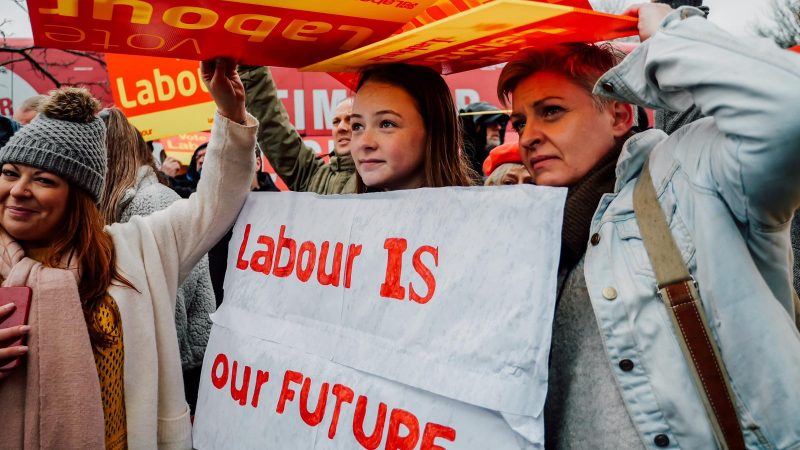
Politics is a quick-fire business. Already, Keir Starmer and Angela Rayner’s ‘beergate’ pledges are dominating the news cycle. But Westminster drama shouldn’t stop us looking at the bigger picture. The 2022 local elections were a golden opportunity for Labour, arriving in the midst of ‘partygate’ and a Tory cost-of-living crisis. The TUC’s snap poll on election day found that three in four voters think that the Conservative government is failing to adequately support people. Across England, Scotland and Wales, the Conservatives were punished accordingly – and deservedly so.
But Labour was not the main beneficiary. Welcome gains in London, including in Wandsworth and Westminster where Momentum activists mobilised strongly and left wingers are set to take key positions, were wiped out by disastrous defeats in Croydon, Harrow and, most spectacularly, Tower Hamlets – another reminder of Labour’s failing of Muslim voters. Across England, Labour made a net gain of just 21 councillors, far fewer than the surging Greens (63) and Lib Dems (192). The leadership’s claims of a “turning point” ring hollow.
In so-called ‘Red Wall’ seats, gains in places such as Cumberland were offset by backward steps in the likes of Amber Valley and Hyndburn. As many out there on the doorstep will attest, Tory defeats were more down to the apathy of their base than mass switching to Labour. (Results for Scottish Labour and especially Welsh Labour were more positive, and deserve their own story.)
Nonetheless, the leadership duly found an excuse to blame it all on the left. Senior Labour figures justified their results both by referencing the high water mark of Jeremy Corbyn’s 2018 result, before going on to suggest that Labour’s underperformance was the result of ‘Long Corbyn’. This absurd doublethink was on display elsewhere: in 2018, Lisa Nandy and Luke Akehurst publicly attacked Labour’s results, yet a similar performance on Thursday saw both wax lyrical about Labour’s ‘recovery’.
The truth is that these election results are distinctly underwhelming. Here we have a Tory Party at its nadir. Yet Labour failed to capitalise in England. Why? As bills skyrocket and wages stagnate, millions are on the brink. Support for bold state intervention – from public ownership of energy to a higher minimum wage – is sky high among supporters of all parties. Yet the Labour leadership remains intent on reassuring Rupert Murdoch and the City that nothing fundamental will change, leaving the wider public cold. Even his most ardent supporters would surely admit that Keir Starmer is not inspiring anyone to the ballot box.
Moreover, Labour lacked the large grassroots activist base to get the vote out, a pivotal concern in low-turnout local elections. We at Momentum may have successfully mobilised to elect socialist Labour councillors in marginal wards but Labour’s wider mobilisation potential is severely limited by the leadership’s active efforts to alienate, smear and drive out large sections of the membership. The end result: fewer people to knock on doors, drop leaflets and phone bank.
These elections should, then, bury the flawed idea that punching left and offering no vision is a vote winner, as if Elsie’s main concern was Corbyn’s scepticism of NATO, rather than avoiding a horrifying choice between heating and eating. Indeed, the national vote share shows that while Labour loses votes to the left to the Greens it cannot get anywhere a majority, even while the Conservative vote collapses. LOTO’s plan to expel the left and tear the Labour Party apart – briefed out just two days before the elections – should be consigned to the dustbin.
Where, then, should we look for hope for Labour? There are, encouragingly, several success stories. In Worthing, an energised activist base partly from the Corbyn era joined with an ambitious manifesto and a united local party to seize the council. Greater activist mobilisation in London paid dividends too. Likewise, the importance of a positive policy offer shouldn’t be under-estimated. In Preston, a radical Labour council has pioneered a community wealth building approach, developing new forms of democratic ownership and localised, progressive procurement. It was duly rewarded with another strong majority, holding all of its seats up for election.
Socialists in local government can deliver transformative change, from public energy schemes to mass council housing, community banks to better mental health support. So we’re thrilled that, despite mass anti-democratic blocking of left-wing candidates by the Labour bureaucracy, around 100 new Momentum members and allies are entering local government as Labour councillors, from Southwark to Sheffield, Leith to Leeds, Wandsworth to Worthing. By delivering in power, we can rebuild our red bases and develop the leaders of the future.
That’s why off the back of this success, Momentum is delighted to today announce the next phase of our Future Councillors Programme, training committed socialists for local government, through the development of organising skills and tactical knowledge to navigate selection processes. Dozens of graduates of the programme have just been elected for Labour.
Momentum is combining this scheme with our new Community Wealth Building toolkit produced with The Democracy Collaborative and launched with Matthew Brown, Preston City Council leader, in the run-up to the locals. We’re rolling out trainings nationwide, as we part of a strategic push across local government.
We’ve long since given up hope on Starmer keeping faith with his 2020 promises of unity and radicalism. But, regardless of his position, one of our key tasks as a movement is to roll out the lessons from socialist success stories across the country and work collaboratively at the grassroots to implement them. That’s what Momentum and socialists in local government will pursue in the coming months.




More from LabourList
‘Energy efficiency changes must work for older private renters’
‘Labour’s creative destruction dilemma’
Economic stability for an uncertain world: Spring Statement 2026